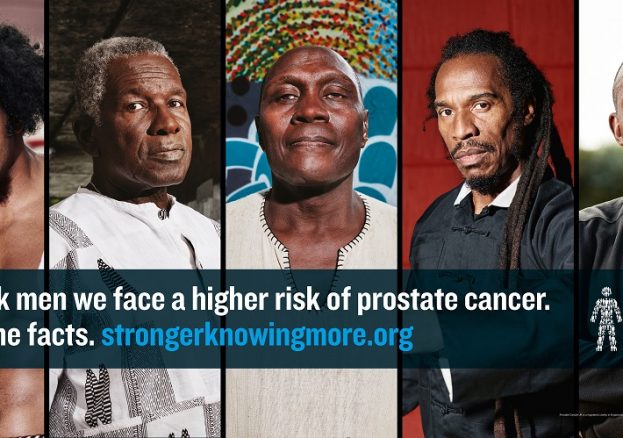
The celebrities are calling on black communities to confront their increased risk of prostate cancer, and break down longstanding taboos that prevent men from speaking out about the disease.
Those backing the campaign include EastEnders actor Rudolph Walker, former WBA World Heavyweight champion David Haye, Olympic gold medallist Linford Christie, and saxophonist Courtney Pine, as well as men affected by prostate cancer. They have all been captured in an exclusive set of images by the highly-acclaimed photographer, Dennis Morris, to get black men across the country talking about their risk of prostate cancer and taking action.
One in four black men in the UK will be diagnosed with prostate cancer in their lifetime and one in twelve will die from the disease – double the risk faced by white men. Black men are also more likely to be diagnosed with prostate cancer at a younger age than men of other ethnicities, but an alarming 86% are oblivious to the increased danger they face, and the disease is still widely regarded as a taboo subject within many families. The celebrated black icons are leading the charge as part of Prostate Cancer UK’s Stronger Knowing More campaign to change these statistics for the better.
Rudolph Walker, 77, Actor
My awareness of prostate cancer is really something very close to home, my uncle died of prostate cancer in America, an uncle that I was very fond of. It was a very painful experience for me, so when I was approached quite a few years after to be involved with Prostate Cancer UK, I just didn’t hesitate. But also, to coincide with that, I encouraged EastEnders to do a storyline about prostate cancer, which they did in 2014 with the character Stan Carter played by Timothy West – that raised quite a lot of awareness.
One in four black men will get prostate cancer – those statistics are not encouraging. My background, coming from the Caribbean, we have a mentality where we don’t talk about anything to do with our private parts. It’s to do with our pride and being macho. Prevention is better than cure and if you capture something like prostate cancer early, then you stand a better chance of beating it.
Thomas Kagezi, 57, diagnosed in 2016
One day I was working near Hoxton station and I came across Errol. Unbeknown to me, Errol had been diagnosed with prostate cancer back in 2011, and ever since had made it his mission to raise awareness of the disease. He was handing out leaflets outside his car garage. He gave me a leaflet about prostate cancer and a black man’s risk, and it made me think that I should go and see my GP and get a PSA blood test, so I did. Shortly after, and to my complete surprise, I was diagnosed with prostate cancer. I’ve gone through treatment and, thankfully got the all clear in early 2017.
If I didn’t go and see my GP and get tested I dread to think what could have happened, as I had no symptoms, which I’ve since learned is common for early stage prostate cancer, when it’s most treatable. It’s so important that we raise awareness of prostate cancer and the increased risk black men face. My dad had prostate cancer and never told anyone, like so many men he just kept it to himself. It’s so important for men to talk about it, because not only was I at an increased risk because I’m a black man, but there is also a familial risk for men who have a father or brother diagnosed with the disease. Having that knowledge would have encouraged me to talk to my GP earlier, that’s why I’m so grateful for my chance encounter with Errol. Being a black man of African origin it’s within our culture, even if you have prostate cancer, to keep it to yourself and not tell anyone – even your family. If nobody speaks about their health, then the knowledge can’t be passed on.
My message to black men is to play it safe. Go and speak to your GP. I had that opportunity to catch my prostate cancer early enough that it could be treated and that gave me a chance to live. But my message to the wider African and African Caribbean communities is to start talking, as I’m living proof how important just one conversation might be – it could be the difference between life and death. If more people know about prostate cancer, then together we can reduce the number of people dying from the disease.
To find out more about the risk of prostate cancer in black men visit: strongerknowingmore.org
